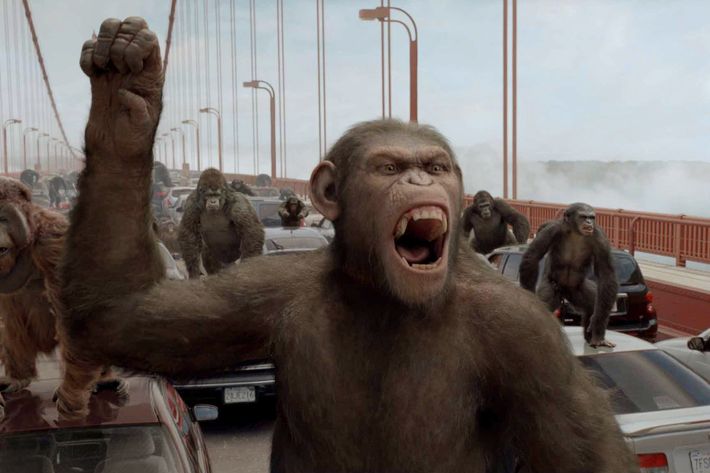

James Marsh’s wrenching documentary Project Nim shows a 1975 New York Magazine cover with a photo of “Nim Chimpsky,” the chimpanzee raised like a human child by Columbia researchers and, years later, unceremoniously tossed back into the primate research population when the professor in charge (a douchebag, no way around it) lost interest. The mag’s cover line reads, “First Message from the Planet of the Apes” — and, a third of a century later, screenwriters Rick Jaffa and Amanda Silver and director Rupert Wyatt have essentially turned the Nim story into just that, a killer Apes prequel called Rise of the Planet of the Apes. The movie is a thrilling ride: fast, tense, emotionally engaging, and computer-animated not just with bravura but — thanks to mime work from Andy Serkis, the live model for the film’s Nim stand-in, Caesar — soul. It’s an inspired fusion of the classic Apes saga with new-style bio-genetic horror. Hail, Caesar!
James Franco plays Will Rodman, a San Francisco Big Pharma scientist with a dad (John Lithgow) in the late-middle stages of Alzheimer’s. In search of a cure, Rodman tests a gene-therapy serum called ALZ 112 on chimps, which get smarter by the day — until there’s a horrific mishap and the creatures are euthanized. (It turns out even super-intelligent apes retain their ape ferocity.) But the star chimp, “Bright Eyes,” has given birth and passed the genetic changes onto the baby. Rodman slips the infant out of the lab and raises it at home, where it’s soon signing, bonding with Rodman Sr. (in remission thanks to ALZ 112), and struggling to find a middle ground between its evolved chimp intellect and primal chimp instincts. Caesar is rather damaged even before he’s (I’m switching to the human pronoun) picked up by Animal Control and dumped in a facility run by Brian Cox (who starred in Wyatt’s first feature, The Escapist) and an overacting Tom Felton, who sneers even more aggressively than he did as Draco Malfoy. It’s the sort of prison — Guantanamo and Abu Ghraib are others — that can radicalize even non-radicals.
Fans of earlier Apes films will detect changes in the Genesis story. But then, the first Planet of the Apes film wasn’t particularly faithful to Pierre Boulle’s underrated novella, a Gulliver saga set not on Earth but its fun-house-mirror image in the orbit of Betelgeuse, where the humans have become complacent and dull-witted (too much TV) while the apes learned to speak and reason. In the late sixties, screenwriters Michael Wilson and Rod Serling turned Boulle’s satire into a civil-rights parable that was harshly funny and brilliantly in synch with its era: In the shadow of race riots and the Vietnam War, the uncomprehending rage of Wasp icon Charlton Heston as he’s shackled by monkeys was priceless. Of the Apes sequels, the best was the third, Escape From the Planet of the Apes, in which the genial chimps Cornelius (Roddy McDowall) and Zira (Kim Hunter) travel back to the seventies and trigger the murderous fear of an ape planet. The fourth film, Conquest of the Planet of the Apes, was almost as good and drew rather audacious parallels to the militant wing of the civil-rights movement. (The cheapo fifth Apes picture was a huge letdown, while Tim Burton’s campy remake was notable only for giving apes a delightful vertical city.)
In Rise of the Planet of the Apes, Caesar is neither a pet-slave who says “No!” nor the son of Zira and Cornelius. He’s lab-grown and, thanks to Serkis (and visual supervisors Joe Letteri, Dan Lemmon, and, I’m sure many others), his hybrid personality comes into being before our eyes. Having modeled the expressions of Peter Jackson’s King Kong, Serkis is primed to take a primate to the next evolutionary level, and his thoughts are beautifully articulated. His Caesar rises up, sniffs, takes the measure of the space, and calculates his options in a way that makes you see just how new his neural pathways are. Victimized by the prison’s dominant ape, Caesar concocts a strategy that’s part Chimp 101, part Sun Tzu. And the other apes — orangutans, gorillas — follow him avidly. It should be said that Caesar has a humanistic side. When he kills, it’s by accident. But there are hints that his cohorts are not so forgiving, and that, in the inevitable sequel(s), our chimp surrogate might suffer the fate of his namesake Julius (or of Lenin at the hands of Stalin).
How are the CGI apes? Excellent if a mite too quick, à la Spider-Man: I think, for the sake of verisimilitude, computer designers need to make living things less smooth, less fluid. But the movie is so deftly shot and edited that you can accept the artifice easily: You labor not to disbelieve. Even James Franco’s spaciness can be taken for spiritual depth, making it especially ironic that he should usher in the end of human civilization.
True, the baby Caesar is a shade too dear, like Giz in Gremlins. Freida Pinto can’t begin to make Franco’s girlfriend (a zoo vet) more than a gorgeous cipher. And the way in which the screenwriters contrive to place the big-pharma capitalist villain (David Oyelowo) at the center of the climactic gun battle on the Golden Gate Bridge is a mite obvious. (Talking apes? Cool! Having this guy jump into a police helicopter? Nah.) Patrick Doyle’s typically stupendous score sweeps aside the absurdities. Rise of the Planet of the Apes never lets the little things sink it. It’s Down with People, Up with Apes.


